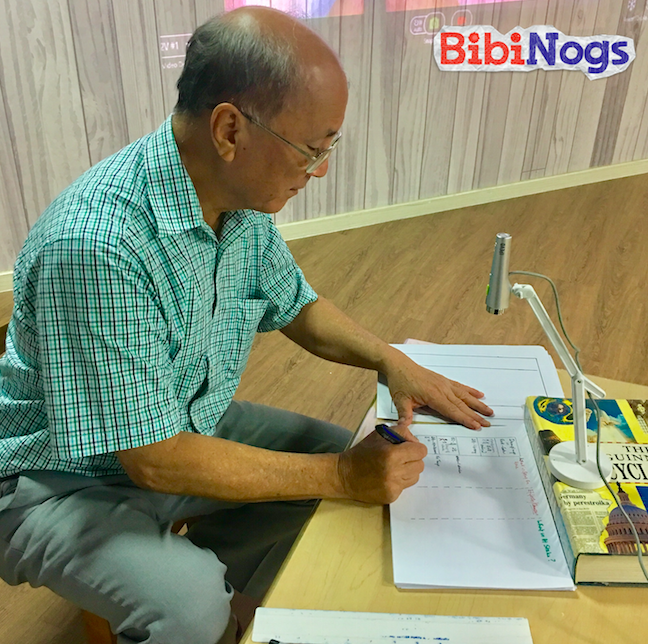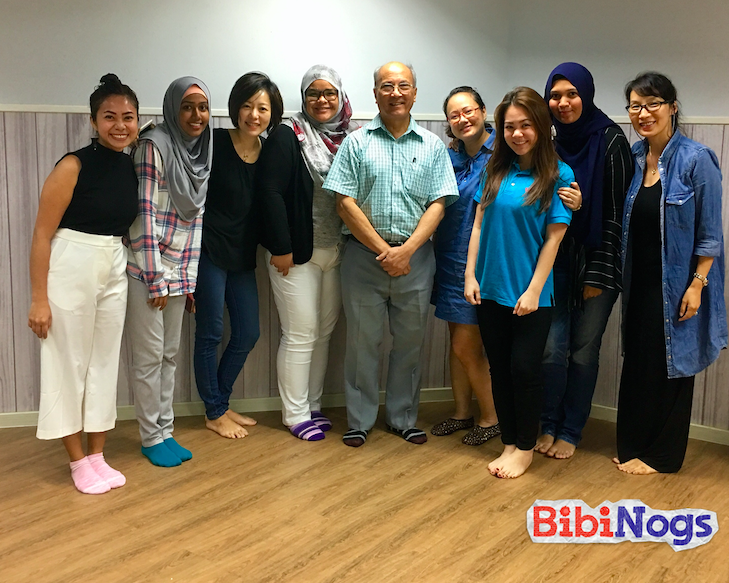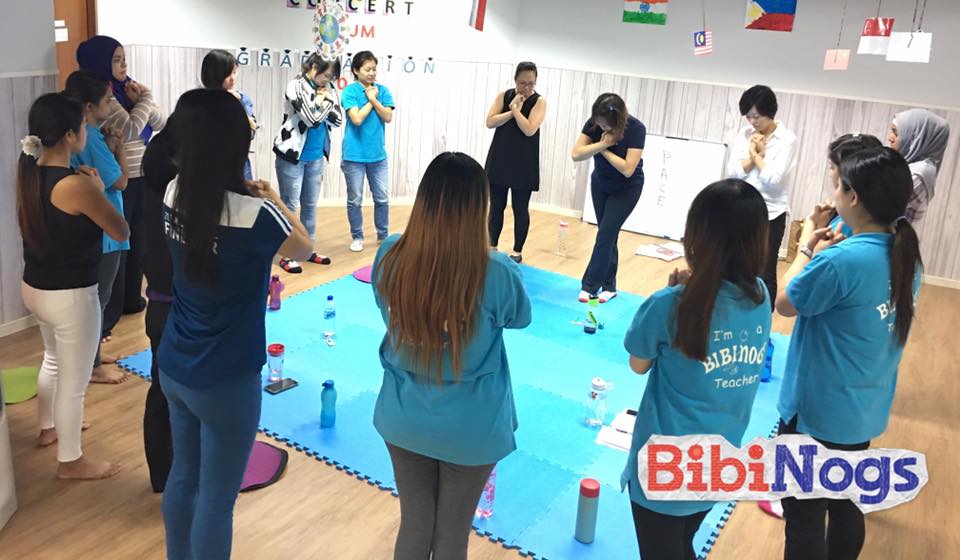Not only that it is fun to ride on the rocking horse and having fun on the grass, it also helps to develop the gross motor skil. It also has many sensory benefits for your little friends!!
Giddy-up, let’s go faster horsey!!
Not only that it is fun to ride on the rocking horse and having fun on the grass, it also helps to develop the gross motor skil. It also has many sensory benefits for your little friends!!
Giddy-up, let’s go faster horsey!!
My very own experience…
Being in the Early Childhood Industry for about 2 decades and being a mother of 3 has allowed me to gather enough insights on the above mentioned subject matter. It is interesting to note that for my 3 children, my youngest was toilet trained earlier than my middle child, my middle child was trained earlier than my oldest girl.
Let me recount my experience with my oldest girl. As an Early Childhood educator, I talked a lot to all my children when they were young, especially my first one, the thrill of being a mother for the first time was firing away then. I remembered when she was a month old, she did not poo for 2 days, and that got me worried. She was laying on my bed and I asked her, “Mummy is kind of worried that you have not pooed for 2 days. Are you ok? Would you like to poo in the toilet?” It was random, and I thought she kind of responded. I took off her diaper and brought her into the toilet. Guess what? She pooed. I was shocked and she was happy. That was the end of story for soiled diapers. When she was 6 months old, we were out and on the way home in our car, she wanted to poo. I told her she could either do it on her diaper or wait for us to get home. She waited and went home to do it. I was totally impressed then.
As for my middle child, we were residing in Beijing then. My mum came over to help me with my confinement. She is a firm believer that children do not like to soil their bottoms and could be trained from day one. So she did train my son. Within a short span of 2 weeks, he would only poo in his potty. Staying in Beijing with a wonderful Beijing Ayi (helper) who believes in early potty training helps. She would diligently bring him to pee at intervals. By his first birthday, I told my son, “Let’s do without a diaper from tomorrow onwards.” Then I meant to do without diapers in the day and not night. To our amazement, his diapers were also dry at night. He took the message literally. What a delightful misunderstanding!
My youngest was born in Singapore with my mum staying next door. She came over to tell my confinement lady exactly what to do. Our confinement lady could not believe what she heard at first but tried anyway. Within days, she was able to signal us that she would like to poo and would hold till we bring her to the potty. It was such a breeze. I must say my youngest was the easiest. From day one, she was dry at night usually. Before she turned one, we just gave her a week notice and took off her diapers. By two, she was totally diaper-free, even when we were out and about.
My classroom experience…
I have personally helped and also coached parents to potty train their children. My observation is that it is easier to train children before they turn two. The first stage of life, before 18 months, according to Erik Erikson, children are building trust. If they do have great bond with their primary caregiver, they build a good foundation of trust. Between 18 months to 3 years old, they are gaining autonomy. If they are unable to do that well, shame will develop.
With Erikson’s theory in mind, children who have trusting relationships with their primary caregiver will feel safe to take their lead to toilet train. When they move on to the next stage, it could be easier or tougher. Our children may want to feel they are in control by using the potty. Or they may fight you as they want to be in control. It is important to talk to your children when you are training them. We do not want them to end up feeling shameful about not being able to go to the toilet in time.
Suggestions…
When you want to toilet train you child, you could do the following:
-> Mummy/Daddy is going to take away your diapers in xx time.
-> Please let us know when you would like to pee/poo.
-> Thank you for letting me know you would like to go to the toilet.
-> It is a nice feeling to keep your bumps clean and dry.
With all the stories told and suggestions given, do enjoy going through every milestone with your little one. Every memory has a chance to become a great one if you let it be.
There’s no BEST programme but only the most SUITABLE one – Joyce Lim
We will be having our Open House on 19 August 2017. Come join us for a morning or afternoon full of fun, adventure and discovery! Take part in free trial classes and learn more about BibiNogs’ programmes, teachers and philosophy/values!
Our Kids Academy’s (Serene Centre) Open House will run from 9.30am to 12pm at Serene Centre, while our Kindergarten’s (King’s Arcade) Open House will run from 12.30pm to 3pm at King’s Arcade. Refer to the following flyers for details.
We hope to see you soon!

Open House for BibiNogs Kids Academy at Serene Centre.
Registration required. Email us at serenecentre@bibinogs.com to RSVP your attendance!

Open House for BibiNogs Preschool at King’s Arcade.
Registration required. Email us at serenecentre@bibinogs.com to RSVP your attendance!
BibiNogs would like to extend our appreciation to Mr. Robert Pereira, a world reknowned trainer/educator, for conducting a very engaging Parent Workshop and Teacher Training session for our parents and teachers last Saturday, 25th March 2017!
The Parent Workshop was titled “How to Manage Our Expectations to Raise Happy Children”. Parents and caregivers had a fruitful morning hearing from Mr. Pereira, reviewing cases studies together and exchanging personal anecdotes and lessons.
In the afternoon, BibiNogs teachers were trained by Mr. Pereira on the topic of “Anti-Bullying Strategies in Young Children”. Mr. Pereira shared his expert viewpoints about causes of bullying, strategies to curb negative behaviours and strategies on how to help children manage.

Parents learning and exchanging viewpoints at Mr. Pereira’s Parent Workshop

Parents eager to know how to raise happy children while setting healthy expectations and keeping them motivated

Mr. Pereira shares his expertise through illustrations and notes

BibiNogs teachers learned a great deal from Mr. Pereira, thank you indeed!
By Joyce Lim, Director of BibiNogs
It can be difficult when we deal with separation as an adult, let alone young children. Parents cringe and sometimes tears well up in our eyes when we see or hear our little gems crying for us.
When your child is separated from you, expect them to cry. In fact, be happy when they do so. It shows that they miss you, they miss home. It is very natural for young children to be attached to you and their main caregivers. Unless your child is extremely extroverted or unattached to anyone, he/she will not be affected by the separation.
After working with young children for many years, I have observed that these are the following factors affecting adjustment to a new environment.
Child’s personality
Depending on personality, your child will react differently when they need to deal with separation. A few questions we may want to ask ourselves:
If a child is an extrovert and someone who is sociable, he/she will most likely take a shorter time adapting to a new environment or situation. Children with such characteristics enjoy interaction. Having teachers and children around them will gain their attention. In the beginning, they will miss home. However, they are interested to make friends and know more about people around them. Thus, the ease of adaptation.
Children who are happy tend to adapt better as well. They tend to look for happy things in life. Being with new friends, playing with teachers appeal to them. Again, though they miss mummy and home, they can be distracted with the excitement in the new environment.
On the other hand, if your child is an introvert, he/she may take a longer while to adjust to a new environment. He/She prefers home to any other environment, he/she likes familiarity.
Past Experiences
Past experiences are one important factor too. Questions to ponder…
Every experience the child goes through gets deposited into his/her memory bank. This in turn will affect his/her future encounters. If it is a school setting, my suggestion to parents is that DO NOT pull your child out from the school while he/she is still in the crying stage. Unless the school is deemed unfit. It is really natural for children to take 2 weeks to a month or so to get adjusted to any new environment.
Truth be told, the same goes for adults! It is just that we do not burst out crying anymore. We are able to contain our emotions within ourselves. Our coping mechanisms would have been built based on the above-mentioned two factors: our personality and past experiences.
Parents’ emotions
Last but not least, parents’/caregivers’ emotions can affect child’s ability to handle his/her separation anxiety. I hear parents say these quite a bit… “I hide how I feel when I drop my child off”, “He/she doesn’t know that I am upset, I don’t show it”.
Children are great at sensing things, especially when they are younger. They are innately connected to parents or primary caregivers. It is advisable for parent to keep your emotions at bay. Drop your child off, say a good “Goodbye” and go get a cup of coffee. Do not linger around, peep… etc. When you do this, your child could feel you and this causes their emotional upheaval. To add on, other children in the class may be reminded about their parents and start crying again.
One of my friend, he sent his child to my preschool. His son cried for the entire month, at drop off and pick up times. During the first month, he was very anxious, without being aware of it. He would call, text or email me every day, including weekends. Finally, I sat him down with his wife, over coffee. We discussed about the child’s situation and agreed that he should cut down his frequency of call/text/email. The outcome? His son stopped crying.
Now, the big question… What should we do as parents?
Things to expect when your child is adjusting…
It is really up to us to make every experience a good memory. Being mindful of all the above mentioned will ease the transition of our little ones into their new environment.
Ms. Joyce Lim has over 20 years of experience in the Early Childhood Education field and is a Certified Trainer in Parent Education and Teacher Training.
Last week, BibiNogs teachers went through a Kinesthetic Strategy training session. Through this, teachers learn to incorporate brain-based movements and exercises into their day to day lessons!
Kinesthetic Learning is highly known to facilitate development of better physical coordination, agility and confidence. It improves areas such as:
– Concentration and Focus
– Memory
– Academic skills
– Social and emotional skills
– Organizational skills
For more information, check out the article below:

BibiNogs teachers being trained on how to incorporate kinesthetic learning strategies into their classrooms
Having repeated this phrase: “Sharing is having more” to my two older kids for almost half a decade, I stopped to ponder as I begin to appreciate the statement more. My extended version – “less” may mean more.
Have we had experiences of buying new toys for our children only to realize that after a week or so, or sometimes merely a few days, they got bored and asked for more? I was chatting with another mummy the other day, she said that her children are getting smarter and they are getting bored of their new toys faster.
Points to ponder:
The above were my own reflections as a parent. I do not indulge my kids by buying new toys but they do get new supplies of toys after birthdays and Christmas celebrations. After a while, I stopped opening up the new boxes of toys. People who know me well would know that I love to have an organized space. To my pleasant surprise, my children started to innovate, re-purpose and re-create their existing pool of toys. Their play became engaging and extensive. They started to creatively use different toys like cars, Lego, dolls, kitchen toys to extend their play.
There will be days when they engage in opening “shops” to sell things or preparing interesting menus for “restaurants”. If not, the two of them would create different things with their Lego & playdough. The latter would sometimes be props for their other role-plays.
In the beginning stage, they may look bored. However, have patience. Soon after they get over their boredom, the “less” things they have would not work against them, but encourage them to create their own play experiences.
Thus, sharing is having more, “less” may mean more!
The benefits of having less would be:
One of BibiNogs’ goals is to groom children to be appreciative of global cultures.
Over Deepavali, the Festival of Lights, we not only celebrated the festival but immersed ourselves in a variety of cultural activities. The children discovered so much about the festival! More importantly, the fun and hands-on activities allowed them to understand more about the Indian culture.
Check out our event slideshow below: